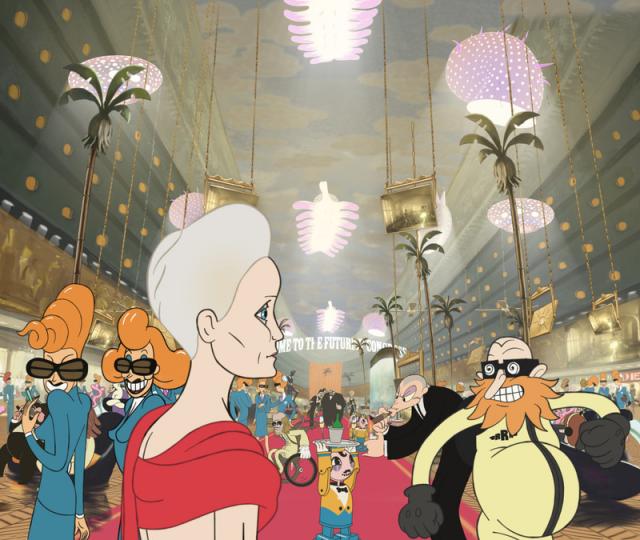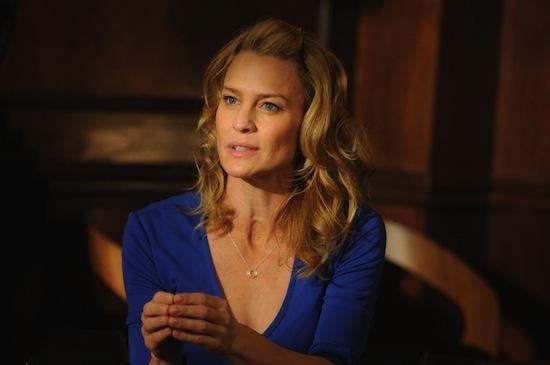
A top-notch, dystopian Hollywood allegory, The Congress imagines a not-so-far-fetched future where flesh-and-blood actors would be rendered obsolete by sophisticated scanning technology. Studios could, for instance, ‘sample’ Tom Cruise or Elizabeth Taylor’s digital likeness until the end of time. When Israeli director Ari Folman (Waltz with Bashir) wrote the screenplay, he had no idea such scanning facilities already existed in California, making his story eerily prescient.
The Congress’ premise, a former film queen (House of Cards’ Robin Wright playing ‘Robin Wright’) forced to sign away the rights to her on-screen identity to afford medical treatments for her terminally ill son, was (very) loosely inspired by Polish sci-fi writer Stanislaw Lem’s The Futurological Congress (1971), but Folman adapted its meditation on dictatorship to the entertainment industry, where frivolous, pretty youths sit atop the food chain. Folman’s film depicts this tragic future world as a psychedelically saturated, Fleischer Brothers-esque animated realm – a setting so trippy and prone to hallucinatory digressions that viewers are left both dazzled and dizzied. Nightlife.ca spoke with Folman on the line from Israel about Robin Wright’s clever hat trick, Stanislaw Lem as a more sane Philip K. Dick, and animating The Congress on four (!) continents simultaneously.
Nightlife.ca: You began toying with the idea of adapting Lem’s book into a commentary on Hollywood after a particular run-in with a famous actress at Cannes. What was it about her?
Ari Folman: It wasn’t about her, but people’s reaction to her: basically, that there was none. She was completely ignored, and this is at Cannes, where everyone is in the film business. Not somewhere in Missouri! I won’t say her name, because I respect her a lot, but she was the ultimate ‘It Actress’ 30 years ago…a total goddess. Now, she was representing one of the independent sales companies at Cannes, and I didn’t recognize her until my sales agent told me who she was. So I wondered what it must be like to be her, an ex-glamorous film goddess walking in this universe as a ‘no name’. Still, her films will survive and live on forever because they were so great, and she will be forever young in them. This is why I explore this idea extensively in the film.
The animation in the film is incredible. It took two and a half years to animate 55 minutes, which you describe as the “toughest mission of your life.” Why was that the case?
You know what? After experiencing one war – as you probably noticed from watching Waltz with Bashir – I would say this was tougher. It was insane. I think because the European system of financing is so complicated, especially for expensive stuff like animation, I had to spend the money where I got it. This is how we found ourselves working in 9 different countries. You can only imagine what it’s like to coordinate such a production, and on the artistic side, just to keep the style and tone the same all over the world. There were single shots that were done on four different continents – not countries, but continents!
Potential investors were reluctant when you pitched the idea – they apparently wanted a Waltz with Bashir: The Sequel, and not some part-live action, part-animation sci-fi allegory starring Robin Wright and Paul Giamatti. Why do you think that was?
Waltz was very successful all over the place, so the people who invested in Waltz in Europe could not understand why I came to them with a sci-fi project with American actors. There is still so much to say about the region [Ed’s Note: Israel and the Middle East], as you can see, the wars don’t end, and Holocaust issues are part of my family, so there was a lot more to explore about these things, they thought. In America, when I won the Golden Globe, they invited me to studios, but they didn’t really know what to do with me – they were not really interested in another Waltz. But they were just completely not interested in this The Congress idea… Perhaps for good reasons, given that it criticizes the system so strongly. Why would the system put money in it, right? It makes no sense.
The Congress taps into the story’s inherent ambiguities: reality versus fantasy, bleak live action versus glossy animation, Robin Wright the character versus Robin Wright the actress, etc. Did you know how far down the rabbit hole you wanted to take it after reading Lem’s book?
Well, put it this way: I just love Lem. I think he’s an underrated genius, always compared to Philip K. Dick, obviously, but I think he’s completely different. Dick was kind of a nutcase with all the drugs he consumed, whereas the other guy was a chemistry professor, very meticulous and serious, coming from a philosophical agenda. Yet I think they attack the same ideas. I think this is probably Lem’s lightest work and I just loved it when I read it. My taste in sci-fi is sometimes edgier – considering my two favourite sci-fi movies are Blade Runner and 2001: A Space Odyssey.
Robin Wright was more than your actress; you’ve called her The Congress' 'template' and your partner in the project. Yet she rejects the notion that there’s any autobiographical dimension to The Congress. What do you make of that?
Well of course I don’t agree, but I have to respect her way of looking at it. I didn’t know that was how she interpreted the whole project until the Cannes premiere, and I thought it was great! (laughs) This is a twist that only an actor, a clever one, could make. That’s why, when I sent her the first draft of the script, I was surprised that she didn’t want to change anything. Only years later did I understand that it was because she didn’t think it was her in the movie, just another Robin Wright that by chance shared the same name, the same filmography (Forrest Gump and The Princess Bride) and the fact that she also has two kids. I thought that was amazing. After doing press for a few days with Robin, I myself started believing it! Because she was walking differently and laughing differently that the Robin from The Congress. And ultimately, who cares.
You’ve always been very open about your conflicted Israeli identity, which you explore through the language of cinema. What do you make of the current state of affairs in Israel?
I find it very depressing to be a part of… but it’s too late for me to go. This is my home, but Israel has changed tremendously in the past 10 years. It has become unbelievably right wing and radical. Some British journalists recently asked me what would have happened had Waltz with Bashir been released this week, in 2014, and I told them that I honestly feel as though my life would have been in danger. This is something that was unimaginable 6 years ago when the film was released. Of course, it was controversial, but I still got government support. It would have been a disaster to release it here today; it would have been a real danger my entire family. That tells you how extreme this country has become. Liberals like me, I honestly believe we’re now 2% who do not support what’s going on in Gaza, and this is very sad… I was born here, this is my home, I live in a loving place by the beach with my kids… But in many ways, I don’t feel a part of it.
The Congress
Now playing at Cinéma Excentris and Cineplex Forum